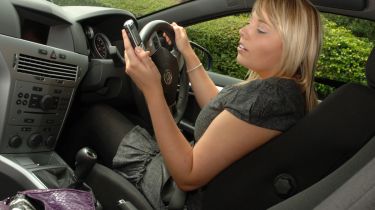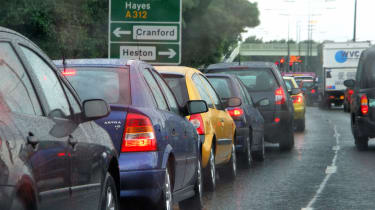Texting and driving is most dangerous distraction for motorists
Scientific study reveals human "autopilot" is shut down when reading or sending text messages at the wheel

An "autopilot" in the brain that prevents distracted drivers veering off course stops working when you're reading or sending text messages at the wheel, a new scientific study has found. The findings, published in the Scientific Reports journal, suggest texting is an especially hazardous activity for motorists.
In tests, 59 volunteers were asked to "drive" along a simulated road while scientists did their best to put them off. Three types of driver distraction were studied - mentally challenging questions, emotionally charged questions, and "texting trivialities".
• Car dashboard warning lights: do you know what they mean?
Each of them caused steering wheel handling to become "jittery" - but only the texting distractions led to major lane deviation and unsafe driving.
Scientists said when trying to handle text messages, drivers received no help from an unconscious "error correction" system in the brain that in other situations intervened to get them out of trouble.
"Sixth sense" for danger disabled when texting
Lead researcher Dr Ioannis Pavlidis, from the University of Houston in Texas, US, said: "The driver's mind can wander, and his or her feelings may boil, but a sixth sense keeps a person safe at least in terms of veering off course.
"What makes texting so dangerous is that it wreaks havoc into this sixth sense. Self-driving cars may bypass this and other problems, but the moral of the story is that humans have their own auto-systems that work wonders, until they break."
• Nissan acquires 34 per cent stake in Mitsubishi Motors
According to the study, the "autopilot" is situated in the anterior cingulate cortex (ACC) region of the brain. Stress from external distractions fed "fight or flight" energy into the drivers' arms, resulting in the jittery wheel handling.

But then the ACC stepped in, counterbalancing any strong jitter to the left with an instant matching jitter to the right, and vice-versa. The net effect was that any veering to the left or right was avoided, and the vehicle remained accurately on course.
Reading or sending texts stopped this system working, and jittery handling of the steering wheel continued leading to drivers veering off course.
• The craziest car options ever
Dr Pavlidis added: "Following up on the results of our science study, we are currently looking into the development of a car system to monitor outward driving behaviours, such as steering jitter or lane deviation, as well as the internal state of the driver that causes them.
"This system, which I call 'stressalyser", a play on the word breathalyser, may serve not only as a 'black box' in car accidents, but also as a driver alert and prevention mechanism, since it will continuously sense a driver drifting to distracted mode."
What do you think the penalty for sending texts at the wheel should be? Let us know in the comments section below...
Find a car with the experts


